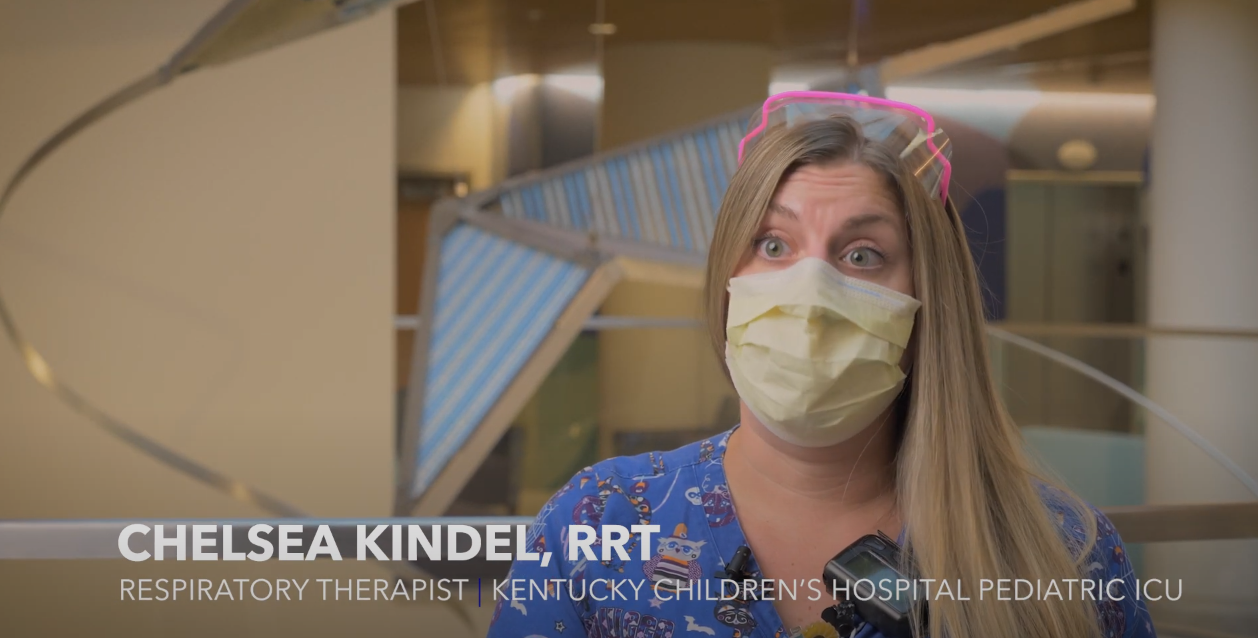Voices from the Front Lines: Chelsea Kindel

We recently joined hospital staff for a few days to document the reality of treating COVID-19 patients in UK HealthCare clinical settings.
This edited interview is part of our ongoing series, “UK HealthCare: Voices from the Front Lines,” highlighting stories and perspectives from our frontline staff who have been caring for the sickest COVID-19 patients since March 2020.
Chelsea Kindel is a respiratory therapist in the Kentucky Children’s Hospital pediatric intensive care unit.
What’s your general focus as a respiratory therapist?
As a respiratory therapist, I really look at a patient's cardiopulmonary status, especially patients that require a ventilator. We have a lot of asthmatic (patients) that require breathing treatments. As a respiratory therapist, I really focus on their breathing.
How has your job changed during the pandemic?
Life has definitely changed. Even with the original wave, we were seeing a lot of adults and very few children. But now, with this Delta variant, we are seeing a high influx of kids that are normally healthy, that are unfortunately getting hit really hard with this.
We're seeing a lot of kids requiring extra respiratory support, and patients that are requiring a lot of oxygen flow along with non-invasive measures like a BiPAP mask or a C-PAP mask. Some do, unfortunately, end up intubating and some have, unfortunately, ended up on ECMO.
A lot of times, that's the last thing that we really want to do, because it really is one of the last measures to hopefully save this child's life.
How has this latest wave affected younger people differently from previous waves?
We are seeing a wide influx. We are seeing (babies) down in the neonatal ICU that were just born that, unfortunately, their mom was COVID-positive and then they ended up being COVID-positive. We're also seeing neonates upstairs in the pediatric ICU that are one month old. We're seeing that age range all the way to 19-year-olds or 18-year-olds that (were) previously healthy, that are sick with COVID and their interventions are ranging from a little bit of oxygen to requiring intubation. We're seeing everything scary.
What are some things that stand out most in your mind from your work during the pandemic?
Not only are we having the influx with COVID-positive patients, but we're also seeing a lot of respiratory patients (earlier than) our normal respiratory season. So, not only are we having these COVID-positive patients come in, but we're having kids that are sick with RSV and bronchiolitis. On top of traumas, we are double-booking these rooms with (two) kids in one room. That's unheard of. We don't have the staff for that, but it's scary when you have a trauma come in, when you're trying to figure out, ‘they're sick, but how sick are they, really?’ Because we need a room for this trauma. But on the positive side of that, I work with some amazing, selfless — the hardest working coworkers. And to be honest, I don't think that I would be standing here if it wasn't for them, because it is very scary. But when you have them bedside with you, you know that it's going to be OK.
What motivates you to keep coming back every day?
Taking care of these patients and their families. These little kids, they need us. Who else is going to take care of them? They need us. But my coworkers that I work with every day, they make it worth it. They make surviving every day here — short-staffed exhausted, run down, haven't had a lunch, have only been going on a couple of hours of sleep — they make it worth it to come back every day, knowing that they're going to be here with you.
How has this affected you and your colleagues?
We're exhausted. We never got a break this summer. Generally speaking, we do (normally) have a little bit of a break over the summer. People are on vacation, people are able to relax, there's not a whole lot of respiratory kids. So generally speaking, the ICU's are nice and calm.
We have not had a break. So, we are run down. We're trying to keep the morale high and really take care of these kids. We are putting a smile on in the rooms. When we leave the rooms, we are very tired.
What would you like the general population to know?
If you have any questions about whether or not you should get the vaccine, talk to a provider, but the alternative has not shown to be any better. Please get the vaccine. Help us out.




